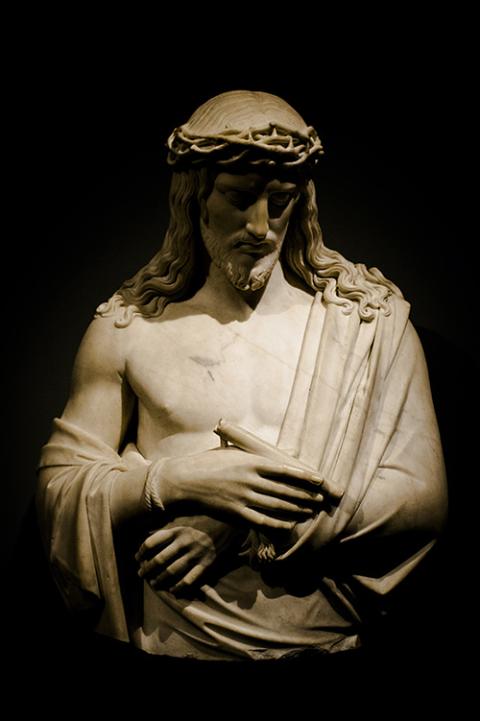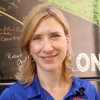
Sr. Quincy Howard takes part in a rally for an accurate Census count outside the Supreme Court April 23, 2019, in Washington. (Courtesy of Network)
After nearly five years, my ministry in federal advocacy is going in a new direction. Since taking my first vows in 2017 I've been engaged in the fast-paced, high stakes, emotionally charged and relentless occupation of pushing Congress to protect our fragile democracy. Particularly with COVID-19, the 2020 election and then the Jan. 6 insurrection the ministry took on an existential import and weighed even heavier on my spirit.
With the onset of the pandemic, I spent hour upon hour, day after day in back-to-back meetings and lobby calls from my bedroom. A friend once described the workday as "future dystopian robot world," which struck a chord. My goal each day was to step away from my computer to go on a walk or take a lunch break, but the truth is that some days I failed to even brush my teeth until 4 p.m.
By early 2021 I was painfully aware that the stress of the ministry and the neglect it meant for my spiritual well-being was not sustainable. Sooner rather than later I would need to create an off-ramp for self-preservation. But crafting an intentional exit plan and exploring different ministry options seemed like an impossible luxury given the relentless pace.
Then a colleague suggested the 30-day Ignatian Spiritual Exercises, describing it as a transformational discernment process. It sounded like exactly what I was looking for. Based on prior spiritual direction with a Jesuit priest, I sensed a resonance with their spirituality so I decided to pursue the idea. By end of year 2021, I figured, the legislative process for our capstone bills would have run its course, so I would time my retreat accordingly. While the legislative timeline was wrong, scheduling the retreat in November was spot-on.
Then, in September — with everything already locked-in at a center in Colorado — it became clear to me that the exercises, the discernment, the entire retreat would revolve around the life of Jesus Christ. In retrospect this should have been a no-brainer (Society of Jesus, ahem!), but when it first dawned on me it was an uneasy realization. You see, my Trinitarian image of God had always been a bit lopsided: God and the Holy Spirit were intimately familiar in my prayer life and in my spirituality. Jesus, on the other hand, remained at the friendly distance of a dear acquaintance. The idea of spending a month with him in such an intimate and vulnerable setting was outside of my comfort zone but there was no turning back.
The first challenge would be disengaging — unplugging from the frenetic, dysfunctional hamster wheel of following and responding to Congress. I decided to drive to Colorado, framing the three-day road trip as a "soft launch." It was perfect: The miles on my odometer were a metaphor for leaving that world behind and approaching the space I wanted to inhabit at the center. By the time I arrived it was surprisingly easy to turn off my iPhone, let go of those concerns, and pivot to the interior.
Advertisement
I can never fully articulate the impact of that time on my soul — and it continues unfolding within me — but I can say it was exactly what I needed. My spiritual director, a Cabrini sister, masterfully adapted the process to meet me where I was so that my reflections and discernment deepened quickly. The hermitage was my own personal cocoon with a cozy fireplace and a distant train whistle to keep me company. My days quickly became a blur of praying, running, taking contemplative walks, reading Scripture, journaling, and practicing unfamiliar reflective exercises like the colloquy.
Moving through those 30 days did not feel like the earth-shattering transformative experience I fantasized about, but it was deeply enjoyable, peaceful and spacious. Neither did the discernment process result in any revelations about what I'm called to do in my next ministry. I finished the retreat much as I had begun: with no idea where my journey would take me next, but with a sense of what my next steps needed to be. The few "concrete" decisions were largely affirmations of what my gut was already telling me. I needed to leave my current ministry for self-preservation, and I could not responsibly make final vows without moving closer to and re-engaging with my congregation in Wisconsin.
The unexpected fruits of that space — the "graces" I received — are still emerging, but I'm able to articulate a couple. First, there's been a shift in how I'm engaging with the uncertain, rapidly changing, daunting terrain that is "the road ahead." Come what may (and there will be a lot to come in the next months!) I have a sense of freedom, calm and solid grounding that makes me confident I can navigate it with integrity. I'm settled into the unknown and embracing the journey of call-and-response differently: confident there is a call and more attuned to listen for it. That call remains a mystery, but now I have an awareness and appreciation for the gifts that I will bring to bear in responding.

(Unsplash/Alessandro Bellone)
Second, I have a budding and passionate relationship with Jesus Christ! We have reached a level of intimacy that enriches my prayer life, my spirituality, and my approach to navigating this crazy world. What would Jesus do? used to be a flippant jingle to me, now it's a sounding board. My Trinitarian triangle is finally balanced, with each "person" bringing a unique and supportive presence to my spirit. I call on them in different ways and they all respond in turn.
I write this as I am taking intentional steps to transform my ministry. Miraculously, I am still hopeful that our democracy protection and voting rights bills may pass. In recent days, I have been transitioning my day-to-day advocacy and organizing to United Methodist Minister Christian Watkins, who recently joined Network's staff. Now, I am giving up this burden to the Divine Advocate. It is no longer my charge to make it happen but I will rejoice when it does.
I have no idea what my next ministry will be, but my spirit is excited and ready for it to take shape in Wisconsin. I am re-engaging with my congregation with a heightened appreciation for their welcome, support and openness to let come what may in this murky process of discerning my call.
I will always think of that sacred time with profound gratitude, knowing that what I received will always remain with me. The truth is that having the liberty of taking that space should not be a secret privilege of the sisterhood. In these noisy and hyper-demanding times, finding and creating openings like these meet a basic need for being human. How might you make it happen?







